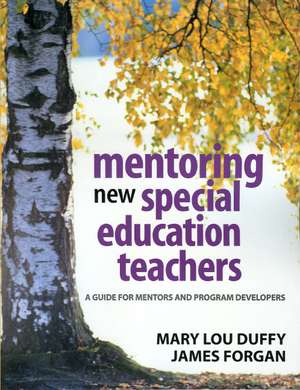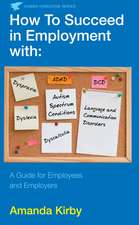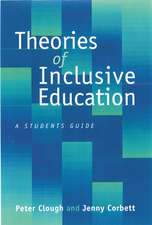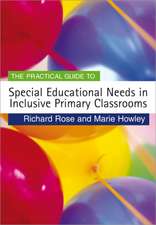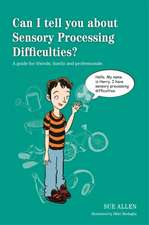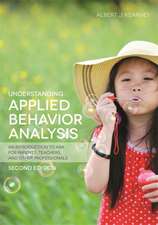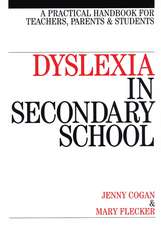Mentoring New Special Education Teachers: A Guide for Mentors and Program Developers
Autor Mary Lou Duffy, James W. Forganen Limba Engleză Paperback – 7 feb 2005
Preț: 313.02 lei
Nou
Puncte Express: 470
Preț estimativ în valută:
59.89€ • 62.70$ • 49.56£
59.89€ • 62.70$ • 49.56£
Carte tipărită la comandă
Livrare economică 07-21 aprilie
Preluare comenzi: 021 569.72.76
Specificații
ISBN-13: 9780761931348
ISBN-10: 0761931341
Pagini: 184
Dimensiuni: 216 x 279 x 13 mm
Greutate: 0.53 kg
Ediția:New.
Editura: SAGE Publications
Colecția Corwin
Locul publicării:Thousand Oaks, United States
ISBN-10: 0761931341
Pagini: 184
Dimensiuni: 216 x 279 x 13 mm
Greutate: 0.53 kg
Ediția:New.
Editura: SAGE Publications
Colecția Corwin
Locul publicării:Thousand Oaks, United States
Cuprins
Introduction:
Overview
Acknowledgments
About the Authors
1. New Special Education Teachers
Vignette
Who Are New Special Education Teachers?
Where They Come From
What New Special Education Teachers Need
Supports ESE Mentors Can Provide Mentees
Fears and Anxieties of New Teachers
School Administrator's Role
Assignment of New Teachers
What If?
References
2. Supports for Special Education Teachers
Vignette
Uniqueness of Special Education
Special Education Processes
Professional Issues
What If?
References
3. Designing Mentoring Programs
Vignette
Critical Elements for Designing Effective Mentoring Programs
Roles and Responsibilities of the Mentor and Mentee
Roles and Responsibilities of the School Administrator
Mentor Selection
Mentor Training
E-Mentoring
Mentoring Activities Calendar
Action Planning
Funding Mentoring Programs
What If?
Online Resources for Designing Mentoring Programs
References
4. Becoming a Mentor
Vignette
Who Should Be a Mentor?
What Do Mentors Do?
What Do Mentors Do When the Mentoring Relationship Isn't Working?
What Do Mentors Gain From the Experience?
What If?
References
5. Effective Communication Skills
Vignette
Effective Communication Skills
Observing and Coaching
Teaming: Working With Others Effectively
Problem Solving
What If?
References
6. Learning About Adult Learners
Vignette
Working With Adults
Adult Learning Theory
Styles of Learning/Personality Types
What If?
References
Resource A: Action Plans
Resource B: CEC Standards and Mentoring Resources
Resource C: Professional Resources
Resource D: Mentor Workshop
Resource E: Timeline for Mentoring Activities
Index
Acknowledgments
About the Authors
1. New Special Education Teachers
Vignette
Who Are New Special Education Teachers?
Where They Come From
What New Special Education Teachers Need
Supports ESE Mentors Can Provide Mentees
Fears and Anxieties of New Teachers
School Administrator's Role
Assignment of New Teachers
What If?
References
2. Supports for Special Education Teachers
Vignette
Uniqueness of Special Education
Special Education Processes
Professional Issues
What If?
References
3. Designing Mentoring Programs
Vignette
Critical Elements for Designing Effective Mentoring Programs
Roles and Responsibilities of the Mentor and Mentee
Roles and Responsibilities of the School Administrator
Mentor Selection
Mentor Training
E-Mentoring
Mentoring Activities Calendar
Action Planning
Funding Mentoring Programs
What If?
Online Resources for Designing Mentoring Programs
References
4. Becoming a Mentor
Vignette
Who Should Be a Mentor?
What Do Mentors Do?
What Do Mentors Do When the Mentoring Relationship Isn't Working?
What Do Mentors Gain From the Experience?
What If?
References
5. Effective Communication Skills
Vignette
Effective Communication Skills
Observing and Coaching
Teaming: Working With Others Effectively
Problem Solving
What If?
References
6. Learning About Adult Learners
Vignette
Working With Adults
Adult Learning Theory
Styles of Learning/Personality Types
What If?
References
Resource A: Action Plans
Resource B: CEC Standards and Mentoring Resources
Resource C: Professional Resources
Resource D: Mentor Workshop
Resource E: Timeline for Mentoring Activities
Index
Descriere
How
do
you
avoid
the
high
cost
of
turnover
and
retain
high-quality
special
education
teachers
in
such
a
demanding
field?
Special education teachers are leaving the field at twice the rate of general education teachers. Why? Mentoring New Special Education Teachers will help administrators and other educators develop and sustain effective mentoring programs specifically designed for special education teachers, providing practical, field-tested activities and resources for both the mentors and the mentees, including such critical elements as:
Special education teachers are leaving the field at twice the rate of general education teachers. Why? Mentoring New Special Education Teachers will help administrators and other educators develop and sustain effective mentoring programs specifically designed for special education teachers, providing practical, field-tested activities and resources for both the mentors and the mentees, including such critical elements as:
- Effectively identifying, recruiting, and selecting mentors
- Action planning
- Evaluating progress
- Addressing diminishing support
- Dealing with burnout and isolation
- Vignettes of real-life mentoring experiences
- Figures, tables, appendices, and Web sites
- A ready-to-use two-day workshop for training mentors
